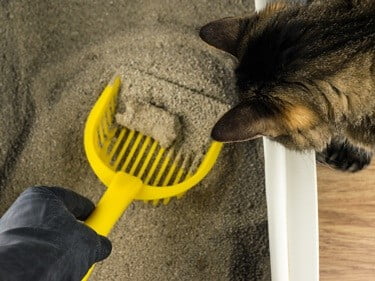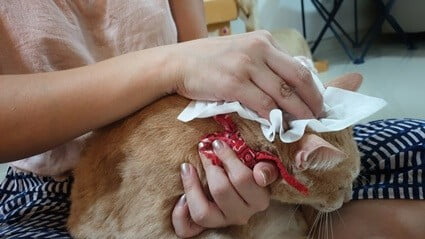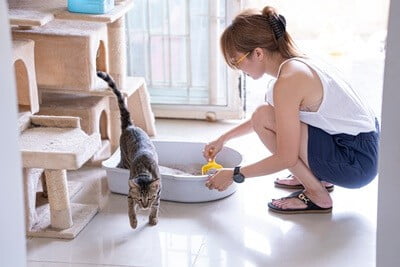If you live with cats for long enough, you may become oblivious to their natural aroma. However, visitors to your home will quickly detect their pungent odor. So, you’ll need to take these steps to stop your home from smelling like cats.
Cats must be allocated their own territory to prevent urine marking. Change your cats’ litter regularly, and clean up and odor-neutralize any toilet accidents. If you have an older or obese cat, assist with daily grooming and cleaning. As a temporary measure, cat-friendly air fresheners and essential oils can be used to mask feline scents.
By managing your cat’s aroma, you’ll soon be able to tell the difference. As a result, your cat will be less likely to mark territory, and you’ll have a more hospitable living environment for your family and any visitors to your home.
How To Get Rid of Cat Smell in Your House
Despite doing everything they can to remain clean and scent-free, cats do have a distinct smell. This odor is especially prominent among senior cats that are starting to find life more difficult to negotiate.
As mentioned, you may no longer notice this smell as you have grown accustomed to it, but people that visit your home will. If you have guests or are looking to sell your property, the smell of cats will need to be removed. Thankfully, it is not difficult to reduce or mask the smell of cats as there are many ways to sweeten and purify the air.
1/ Remove And Clean Out Dirty Cat Litter
Litter is one of the main contributors to cat smells in the home. When we consider what cats do in the litter tray, this is hardly surprising. Your cat’s litter must be changed and cleaned out regularly.
You could get a scented litter to improve the smell. Many cats will reject this, though, as they can be fussy about where they poop and pee. A standard absorbent litter works fine, but scoop it out immediately after usage.
At least once a week, give the box a thorough clean with an odor-neutralizing agent. Ensure this scent passes before returning it. You will likely need multiple litter trays in the home as your cat will always need easy access to at least one. Where you place these trays will also have a significant impact on the freshness of your home.
Change The Location of Trays
A spare room is ideal for a litter tray, especially if it has a window for the cat to view the outside world. The cat’s scent will then be restricted to one location. This window can be left slightly open for airing as long as you’re not too high up. Avoid leaving trays in spaces like the kitchen and living room as these are the areas that you will frequent the most.
The bathroom can also be a good place for litter trays, provided that moisture levels are managed. You may need a dehumidifier in your bathroom, or the litter will clump up.
Do not be tempted to place litter trays outside, such as on a balcony. This is dangerous for cats, who may grow distracted and fall from height. Wind will also blow the litter everywhere, adding to your cleanliness woes.
Select Suitable Litter Trays
Self-cleaning litter boxes do the cleaning work for you. These are mechanized appliances that automatically rake out clumping and soiled litter. This will reduce smells on an ongoing basis.
However, self-cleaning litter boxes aren’t always reliable. In addition, they can frighten some cats. A cat already feels vulnerable when using a litter box, and an automated procedure may mean that your cat is reluctant to eliminate.
As an alternative, you could consider a hooded litter box. This will contain scents within the box and grant your cat complete privacy. Of course, not all cats enjoy these boxes, but they are an option that’s worth exploring.
You could also consider the use of a litter mat. This is the feline equivalent of a doormat. Just place a small rug next to the litter tray for the cat to step on. The cat will then naturally wipe its feet and paws after eliminating.
This process will remove the worst of any clumped litter from feline paws. This, in turn, prevents your cat from treading litter and poop into your carpets. As a result, you won’t need to need to wash your carpets as regularly.
2/ Remove Stains
Your pet will have an accident in the home at some stage, especially if your cat is old and incontinent. According to Veterinary Record, the cat may have a UTI or have inherited incontinence genetically.
If this happens, clean up the stain and mask the scent, especially if it’s urine. Once feline pee sinks into a carpet, the stench of ammonia is hard to remove.
White vinegar, water, and baking soda work well. The baking soda absorbs the scent, while the vinegar and water remove the stain. This ensures no lingering aromas. Also, your cat will not be tempted to urinate in the same spot.

3/ Clean Your Cat’s Fur
Most adult cats spend up to 50% of their day grooming themselves. This is because cats are aware of their own scents and are trying to remove them. This makes it harder for predators to detect cats.
As grooming requires significant energy and flexibility, this can be problematic for older, arthritic cats. Also, obese cats will struggle with grooming as the excess body mass makes it difficult to reach certain body parts.
If your cat’s fur is starting to look matted or greasy, it’s not grooming enough, and your home will start to develop a cat smell. You will need to help your cat with grooming.
The most effective way to assist with grooming is to introduce a daily routine. While you are petting your cat, start cleaning its fur with scent-free wet wipes.
You won’t need cat-specific wet wipes from a pet shop. Instead, standard, unscented baby wipes will be fine. These will distribute natural oils around a cat’s skin. This, in turn, prevents blocked pores and patches of musky sweat.
While wiping down your cat, pay particular attention to the toilet areas. As cats struggle to groom, urine and feces can become trapped in the fur around the bottom. This will add to a cat’s natural, unmistakable musk.
4/ Bathing Cats
Bathing a cat is considered a last resort and may never be necessary. Regularly cleaning your cat with wet wipes will usually suffice. A particularly unhygienic cat may need a more thorough cleaning session, though.
Many cats loathe water, so do not force your cat into the bathtub. Equally, do not hose it down with a power shower because this will traumatize the cat. You’ll just be scratched or bitten, and the cat will not end up clean.
Instead, gently lower a cat into a kitchen sink that’s half-filled with lukewarm water. From here, slowly work on cleaning the cat’s fur. Use a cat-specific shampoo. Felines have particular skin pH, and human shampoos will harm the skin.
Once your cat has been bathed, dry it off with a soft towel. If your cat will tolerate it, use a hairdryer on a low heat setting. Wet fur reduces a cat’s temperature and leads to lingering odors.
5/ Remove Shedded Fur
Cats shed fur, especially longhaired breeds. This process begins in earnest at the onset of spring as the cat detects the arrival of longer days. This means it is ready to get rid of any excess fur it grew for warmth during the winter.
Shed cat fur smells unpleasant and will end up all over your home. Cats have no control over how much they shed as it’s a natural process. A pile of fur and dead skin will follow where the cat goes, which will eventually start to smell.
Once a day, take your cat outside for a thorough brushing. Ideally, pick up a brush that is designed to remove loose fur. By lending a hand, your cat will have less smelly fur to shed in the home.
6/ Vacuuming Carpets And Soft Furnishings
Never neglect carpets, rugs, cushions, and soft furnishings when cleaning. Cats gravitate to these materials, leaving an unmistakable feline scent. The more these items smell of cats, the more cats will mark them.
Soft furnishings should be washed once a week. Use a spray bottle solution of soapy water. This is usually enough to get rid of cat odors, although adding baking soda will absorb more smells.
Regular vacuuming is a must as your cat will constantly shed dead skin (dander) and hair throughout the day. This will settle on your carpet and start to give off a pungent aroma.
7/ Cleaning Furniture
Be sure to clean furniture daily. This does not need to be a full wash and scrub every time. A simple once-over with a sterilized cloth will work. This will remove new cat scents that may otherwise sink into the upholstery. If a sofa has a neutral smell, it is less likely to mark it further.
8/ Assign Territory To Each Cat
Cats feel strongly about territory. Your cat will want to declare everything in your home as its own, which will involve scent marking. If an item smells strongly of a cat, it has been claimed.
In usual circumstances, this will involve rubbing the paws or face as these body parts contain scent glands. The cat is leaving its scent on an item. Initially, this scent will be subtle. Over time, it will accumulate.
Some cats upgrade their scenting practices to include soiling items with urine or feces. This can be a sign of stress. The Journal of the American Veterinary Association links bed soiling to separation anxiety.
More often, this is scent marking. Your cat is growing increasingly bold and dominant. The only effective way to combat this is by assigning a cat its own undisputed territory.
Use a spare room if you can. If this isn’t an option, a corner of the home will suffice. Just ensure the cat is never disturbed in this territory. It’ll also require toys, scratching posts, and sensory stimuli.
9/ How To Get Rid of Cat Odor in The Air
Air freshener must be used sparingly with cats in the home. Cats have sensitive noses and may find the spray too potent. Cats may also be allergic to a canned air freshener. If your cat displays the following symptoms, cease usage:
- Coughing or sneezing
- Streaming from the eyes or nose
- Excessive scratching
- Breakouts of hives
- Difficulty breathing
- Vomiting
Air freshener is not a permanent solution to feline odors. You will simply be masking the scent of cats, not removing it.
Essential Oils And Scented Candles
These will create a softer aroma in your home. Keep these in a safe location, where a cat can’t knock them over. Cats become stressed by smells they dislike. If you force a cat to live in an uncomfortable environment, it will become increasingly anxious. Scents that most cats find agreeable include:
- Lavender
- Frankincense
- Helichrysum
- Opaiba
Again, these aromas will not single-handedly stop your home from smelling of cats. Eventually, they will mix in with the natural feline smell. However, they give you time to work on the cause of the bad aroma.

Natural Air Fresheners
Baking soda is a natural, cat-safe alternative to store-bought scent diffusers. In addition, it is effective at absorbing unwanted scents in the air.
Put some baking soda into an open vessel, such as a mason jar. Leave this somewhere prominent in a room with cat smells as the aroma will be drawn to the baking soda. You can change the supply every other day.
Air Filters And Air Purification
You will need to think about how you can circulate air around your home. A free-standing air filter will be beneficial. This will prevent feline scents from lingering in one place and steadily building. If the air constantly circulates, so will the aromas within. Coupled with air fresheners, you’ll enjoy a more pleasurable smell in the home.
You could open a window to air out a room. Consider the safety concerns surrounding doing so. As per the Journal of Feline Medicine and Surgery, cats can fall from tall heights.
10/ Feline-Specific Diet Plan
Excessive protein will make a cat’s urine smell particularly strong. More protein results in the production of a chemical named urea in the urine. This lends itself to the potent stench of ammonia in cat pee.
Avoid carbohydrate consumption. This food group is not required, and the feline body struggles to break them down. This can lead to upset stomachs and chronic flatulence. In addition, if your cat eats inappropriately, this will be reflected in the waste and general unpleasant aroma of your property.
Living with a cat does not mean your home needs to smell disgusting. To prevent your home from smelling like cats, you’ll need to be more organized with the day-to-day cleaning of your cat’s litter tray and the areas that it visits. Also, assign your cat territory and remove any feline odors immediately to prevent further scent marking.


Thank you for taking the time to write this helpful article. I have 2 cats in an apartment they are only 6 months, and our home is just starting to take on the cat aroma; however when we had 5 cats in our home we didn’t notice the car aroma; I guess smaller living accommodations makes a big difference. I am pleased I was able to find your recommendations, and that they are simple and easy to incorporate into our lives.